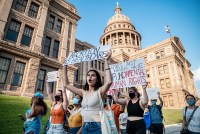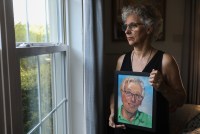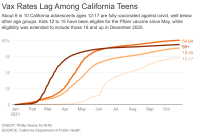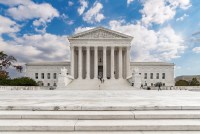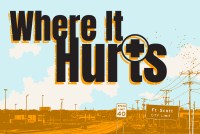Latest Morning Briefing Stories
‘An Arm and a Leg’: The Insurance Warrior’s Battle Plan
Health care — and how much it costs — is scary. But knowledge is power. Take a master class in winning insurance appeals. In the case of Matthew Lientz, taking on his insurance also meant going up against his employer.
The ER Charged Him $6,500 for Six Stitches. No Wonder His Critically Ill Wife Avoided the ER.
With few options for health care in their rural community, a Tennessee couple’s experience with one outrageous bill could have led to a deadly decision the next time they needed help.
KHN’s ‘What the Health?’: Boosting Confusion
Federal health officials appear poised to extend a recommendation for covid boosters to all adults, following moves by some governors and mayors to broaden the eligible booster pool as caseloads rise. Meanwhile, the Food and Drug Administration finally has a nominee to head the agency: former FDA chief Robert Califf. And Medicare premiums for consumers will likely rise substantially in 2022, partly due to the approval of a controversial drug to treat Alzheimer’s disease. Tami Luhby of CNN, Sarah Karlin-Smith of the Pink Sheet and Rachel Cohrs of Stat join KHN’s Julie Rovner to discuss these issues and more. Also this week, Rovner interviews Dan Weissmann, host of the “An Arm and a Leg” podcast.
Texas Abortion Law Harms Survivors of Rape and Incest, Activists Say
While anti-abortion activists say abortion exceptions are a “punishment” to “innocent human life,” social workers say Texas’ new abortion law rigidly curtails options for rape and incest survivors at a moment when they need the “power and control” of choice to begin healing.
How Rural Communities Are Losing Their Pharmacies
More than 1,000 independent rural pharmacies have closed since 2003, leaving 630 communities with no retail drugstore. As 41 million people stuck in pharmacy deserts make do, the remaining drugstores struggle to survive.
KHN’s ‘What the Health?’: Why Health Care Is So Expensive, Chapter $22K
Congress is making slow progress toward completing its ambitious social spending bill, although its Thanksgiving deadline looks optimistic. Meanwhile, a new survey finds the average cost of an employer-provided family plan has risen to more than $22,000. That’s about the cost of a new Toyota Corolla. Alice Miranda Ollstein of Politico, Anna Edney of Bloomberg News and Rebecca Adams of CQ Roll Call join KHN’s Julie Rovner to discuss these issues and more. Also this week, Rovner interviews Rebecca Love, a nurse academic and entrepreneur, about the impending crisis in nursing.
As Workers Struggle With Pandemic’s Impact, Employers Expand Mental Health Benefits
Many job-based health plans broadened their mental health and substance use coverage to make sure workers had the support they needed this year as pandemic stress lingered, the annual KFF survey finds. Also, the proportion of employers offering health insurance to their workers remained steady, and increases for premiums and out-of-pocket health expenses were moderate.
KHN’s ‘What the Health?’: Compromise Is Coming — Maybe
Democratic negotiators on Capitol Hill appear to be nearing a compromise on President Joe Biden’s social spending agenda, spurred partly by Democratic losses on Election Day in Virginia. Meanwhile, the Supreme Court hints it might allow abortion providers to sue Texas over its restrictive new ban. But the relief, if it comes, could be short-lived if the court uses a second case, challenging a law in Mississippi, to weaken or overturn Roe v. Wade. Alice Miranda Ollstein of Politico, Margot Sanger-Katz of The New York Times and Mary Ellen McIntire of CQ Roll Call join KHN’s Julie Rovner to discuss these issues and more. Also this week, Rovner interviews KHN’s Rae Ellen Bichell, who reported and wrote the latest KHN-NPR “Bill of the Month” feature about an emergency bill for a nonemergency birth.
About 21% of patients diagnosed with covid during a hospital stay died, according to data analyzed for KHN. In-hospital rates of spread varied widely and patients had no way of checking them.
‘An Arm and a Leg’: Need Surgery to Save Your Life? Tips for Getting Insurance to Pay
Laurie Todd calls herself the “Insurance Warrior” and is sharing her strategies for getting health insurance companies to bend to her will.
‘Not Quite on Board’: Parents Proving a Tough Sell on Covid Vax for Teens
California offers a lens on the challenges officials face in persuading parents to embrace covid shots for young children. While the state has a strong showing in overall vaccination rates, just 59% of kids 12 to 17 — eligible for a shot since May — are fully vaccinated.
Texas Abortion Law Gets Speedy High-Court Hearing Monday
The Supreme Court justices, who accepted the case only 10 days before the arguments will be made, may skirt the issue of abortion and concentrate instead on the legality of the law’s unusual tack to let private citizens enforce it.
KHN’s ‘What the Health?’: Biden Social-Spending ‘Framework’ Pulls Back on Key Health Pledges
President Joe Biden unveiled a compromise “Build Back Better” framework shortly before taking off for key meetings in Europe, but it’s unclear whether the framework can win the votes of all Democrats in the House and Senate, and it leaves out some of the party’s health priorities, notably significant provisions to lower prescription drug prices. Meanwhile, younger children may soon be eligible for covid vaccines. Joanne Kenen of Politico and Johns Hopkins, Sarah Karlin-Smith of the Pink Sheet and Rachana Pradhan of KHN join KHN’s Julie Rovner to discuss these issues and more.
How Billing Turns a Routine Birth Into a High-Cost Emergency
“Obstetrical emergency departments” are a new feature in some hospitals that can inflate medical bills for even the easiest, healthiest births. Just ask the parents of Baby Gus.
Confronting Ageism in Health Care: A Conversation for Patients, Caregivers and Clinicians
A frank, practical and empowering conversation about this pervasive, systemic problem of bias, discrimination or stereotyping based on age.
‘No Mercy’ Bonus Episodes: More From Fort Scott, Kansas
Check out the latest bonus episodes from the award-winning “Where It Hurts” podcast.
KHN’s ‘What the Health?’: Dems Agree to Agree, But Not on What to Agree On
Negotiations on the health parts of President Joe Biden’s domestic agenda are getting serious but have yet to produce a deal every Democrat can support. Meanwhile, the Food and Drug Administration remains without a nominated leader but manages to take the first steps toward approving over-the-counter hearing aids. Joanne Kenen of Politico and Johns Hopkins, Tami Luhby of CNN and Rachel Cohrs of Stat join KHN’s Julie Rovner to discuss these issues and more. Plus, for extra credit, the panelists recommend their favorite health policy stories of the week they think you should read too.
Scientists Search for Cause of Mysterious Covid-Related Inflammation in Children
Scientists treating kids for MIS-C point to rare genes, leaky guts and a “superantigen.”
Children With Disabilities Face Special Back-to-School Challenges
For children with special needs returning to an L.A. classroom, mask-wearing is the least of their troubles.
California’s Mental Health Crisis: What Went Wrong? And Can We Fix It?
KHN’s Angela Hart leads a lively discussion on the challenges facing California’s mental health care system and potential solutions. The panel was part of a broader symposium on mental health and addiction hosted by the Sacramento-based publication Capitol Weekly.






